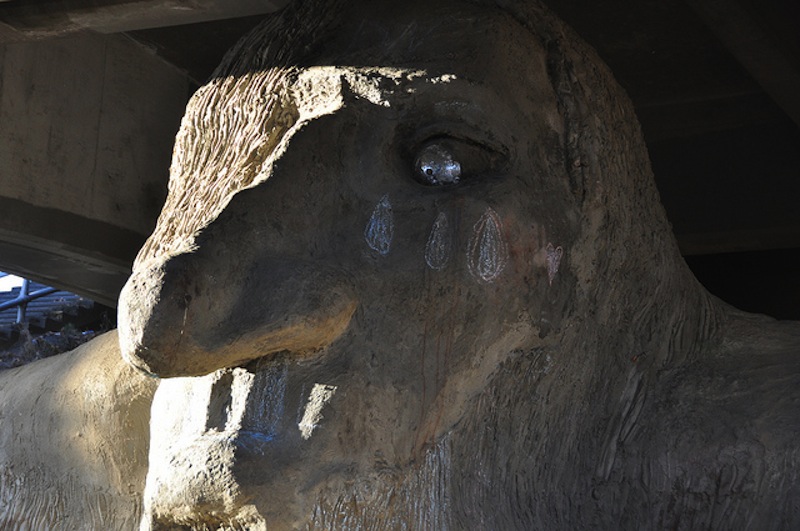On The Figure Of The Troll
by byStrategy
2 August 2013

1.
Language is a plastic thing. One cannot be too precious about new and different uses of words once held in one context. Indeed the plasticity of language is one of the key engines of the innovation and diversity of internet culture. However, recent discussion of the word troll and its slippage into a term to mean only “vicious abuse online” is concerning. I am of course here not defending those who use online fora to send threats of sexual assault to women, or perpetuate misogyny. Strategies need to be developed to prevent these abuses. However the conflation of trolling solely with abuse seems to be indicative of a wider tendency regarding online discourse. Often the cry of “troll” is the response to every and every even reasonable critique – the fear of the powerful of the mob.
2.
Trolling even in its classic form – the taking of a different identity (more often than not maintaining a position the troll does not hold) to deliberately stir up trouble and cause (often deliberately) intractable arguments in online communities – can of course be offensive and abusive. Its often not fun being trolled. The whole point is to make people angry. It is not entirely harmless, but it is not uninteresting either. The lulz (the humour derived from trolling) is often radically im/amoral.
But as DSG pointed out a while back with groups like Anonymous there is increasingly a fluidity between lulz based disruption and economic and political disruption in the service of politics. This phenomena cannot be avoided. For many net natives trolling is the first taste of rebellion.
3.
At its best trolling was a disruption of online communities where certain cultures, belief and practices have become so entrenched as to be naturalised and unexamined. It can be creative, cunning, smart. A troll knows the communities it trolls. She knows their push buttons, she must understand how to simulate membership of the community effectively to gain trust. They know where the levers are and how to use them. They must understand technologies of anonymity and evasion. These skills can be respected – they are a craft of sorts.
The troll is often an organic sociologist of online communities. At the same time calling out a troll is difficult precisely because the best trolling would be so subtle that it would be indistinguishable from at least some of the dynamics within the community itself – a newbie not understanding the culture and posting something stupid. More interestingly perhaps, for an online community to recognise a troll it requires a certain level of self-consciousness amongst members as to their own dynamics. To understand the troll is to understand internet communities. Maybe trolls were the first to do so in the age of usenet and BBS.
4.
An example: persistently tweeting “your a dick” at Richard Dawkins. To explain the joke is perhaps to make it boring but the reason why this works as a troll of internet based atheists is because that community are fans of Dawkins and sticklers for proper grammar and this causes them to get mad. Its pointless, but its also subtly quite funny. It understands better the structure of this community than most commentators on the subject and does so entirely organically. As Biella Coleman says of Anonymous “our weirdness is free”. Acts like trolling especially when done in groups are the organic unpredictable and self-made popular culture of the internet. We build it for ourselves.
5.
The taking of the word troll to mean simple abuse is a symptom of the increasingly flattening corporate space of the internet. Facebook asks for your real name because it thinks your real name is the only identity that can be. Rather than the properly anarchic early days of internet communication, where people were permitted to fashion identities and build communities as they saw fit, wildly innovative in their dynamics, it speaks of an increasingly controlled and administrated cybernetic sphere. These innovative spaces naturally were eventually only colonised by capital as is the ongoing dynamic online – the vampire incapable of innovation. Is not the shock comedian or reactionary columnist – taking the art of trolling at its most superficial and banal level mainly for advertising hits – the attempt at the corporate mainstream media recreation of the troll?
6.
The troll is disruptive, and disruption cannot be permitted in an internet that values clear and clean communication – only clear and clean communication can have advertising data extracted from it – only clear communication can create the metric on the self as a consumer that will then later be sold to the highest bidder – only clear and clean communication ensures the smooth operation of the online space as a sphere of marketing and sales. The figure of the troll rightly understood is one nightmare of this space.